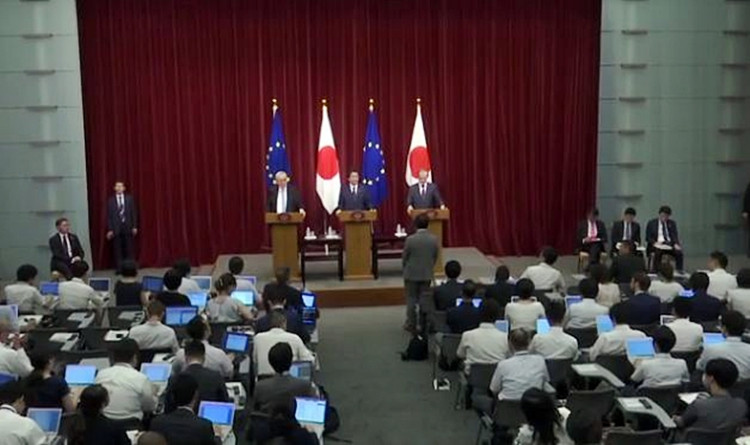Japan and the European Union (EU) on July 17 signed the pro-free trade "EU-Japan Economic Partnership Agreement (EPA)" that will create the world's largest open economic area practically free from tariffs of any kind.
The result of four years of negotiation, the EPA was finalized in late 2017 and remains on track to be implemented by the autumn of 2019. The total trade volume of goods and services between the EU and Japan is $100 billion a year.
The EPA intends to eliminate 99 percent of tariffs that cost businesses in the EU and Japan nearly $1.17 billion annually. The European Commission describes the EPA as the largest trade deal ever negotiated by the EU. EPA will create a trade zone covering 600 million people and nearly a third of global GDP.
Japanese Prime Minister Shinzo Abe and European Commission (EC) President Jean-Claude Juncker and European Council President Donald Tusk yesterday signed the EPA at the 25th EU-Japan Summit in Tokyo. The agreement was supposed to have been signed during an EU-Japan summit in Brussels on July 11, but the meeting was canceled by Abe due to the recent flooding disaster in Japan.
In 2013, EU governments instructed the EC to start negotiations with Japan. The EU and Japan reached an agreement in principle on July 6, 2017 on the main elements of the EPA. Negotiations were finalized in December. The signing on July 17 followed.
The EC will now submit the agreement for the approval of the European Parliament and EU Member States. It has proposed to the Council and the European Parliament that they approve the EPA.
"We are sending a clear message that we stand together against protectionism," said Tusk after signing the deal, in an implied attack on Donald Trump and his protectionist and anti-free trade policies. Juncker echoed Tusk's sentiments.
"This is the EU at its best, delivering both on form and on substance," said Juncker. "The EU and Japan send a powerful message in defense of open, fair and rules-based trade. This agreement enshrines common values and principles, and brings tangible benefits to both sides while safeguarding each other's sensitivities.
"In line with the commitment made in July, we finalised the discussions before the end of the year. We will now do the necessary to submit the agreement to the European Parliament and EU's Member States so that our companies and citizens can start exploring its full potential before the end of the mandate of my Commission."
EU firms export over $76 billion in goods and $37 billion in services to Japan every year. These firms, however, face trade barriers when exporting to Japan that make it hard for them to compete.
The trade agreement with Japan will remove these barriers and help the partners shape global trade rules in line with their high standards and shared values. Equally important, EPA will send a powerful signal that two of the world's biggest economies reject protectionism.
EPA will open huge market opportunities for both sides; strengthen cooperation between the EU and Japan in a range of areas; reaffirm their shared commitment to sustainable development, and include a specific commitment to the Paris climate agreement for the first time.






